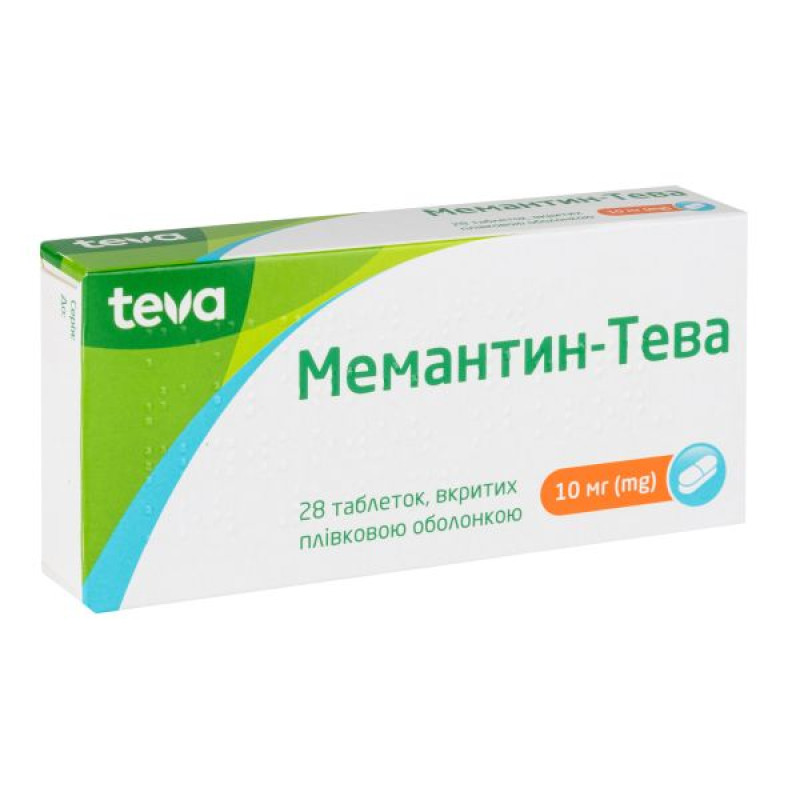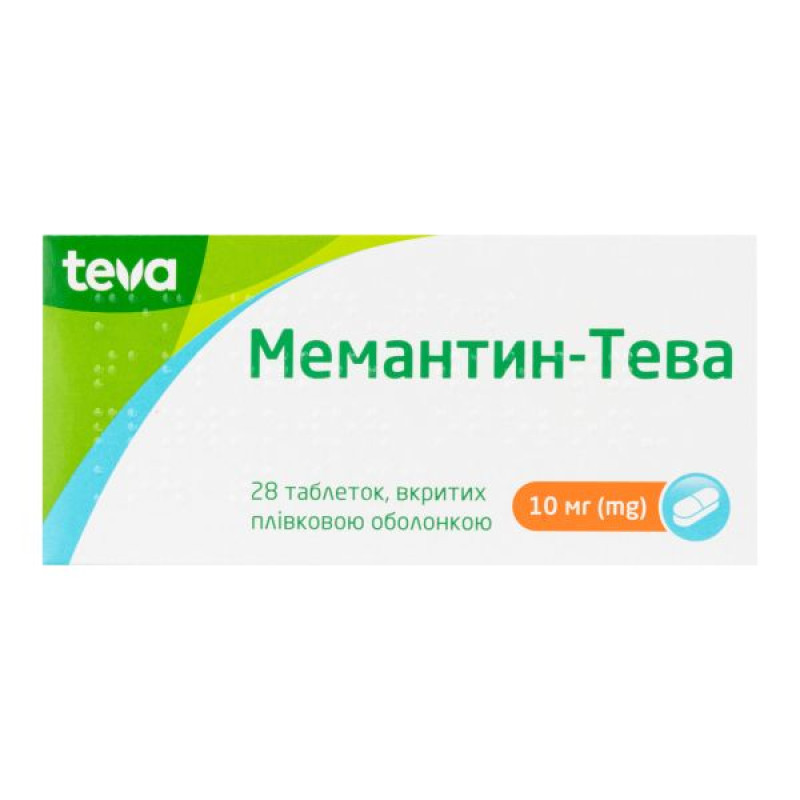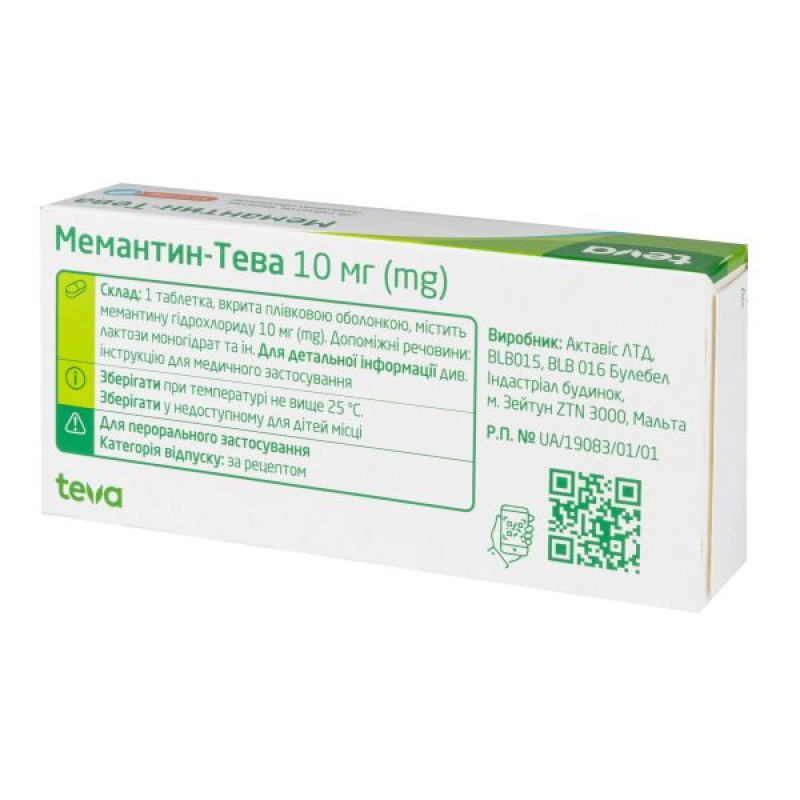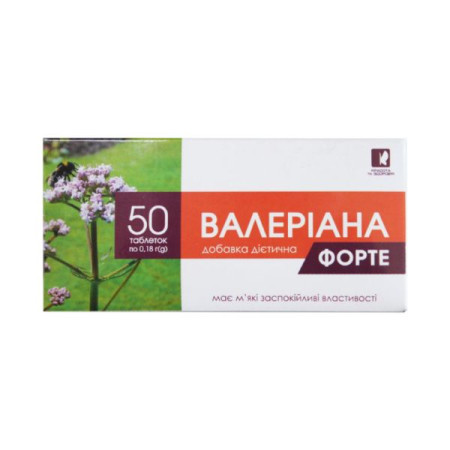Memantine tablets 10 mg No. 28

Instructions for use Memantine tablets 10 mg No. 28
Composition
active ingredient: memantine hydrochloride;
1 film-coated tablet contains memantine hydrochloride 10 mg or 20 mg;
excipients:
core: microcrystalline cellulose, crospovidone (Type A), talc, magnesium stearate;
film shell:
10 mg tablets: hypromellose 6cP, titanium dioxide (E 171), lactose monohydrate, macrogol 3350, triacetin;
20 mg tablets: hypromellose 6cP, titanium dioxide (E 171), lactose monohydrate, macrogol 3350, triacetin, red iron oxide (E 172), yellow iron oxide (E 172).
Dosage form
Film-coated tablets.
Main physicochemical properties:
10 mg tablets: white, capsule-shaped, biconvex, film-coated tablets, debossed with “M” and “10” on one side, separated by a score line, 9.8 x 4.9 mm in size. The tablet can be divided into two equal doses.
20 mg tablets: dark pink, oval, biconvex, film-coated tablets, debossed with “M 20” on one side, measuring 12.6 × 7 mm.
Pharmacotherapeutic group
Psychoanaleptics. Other agents for use in dementia. Memantine. ATX code N06D X01.
Pharmacological properties
Pharmacodynamics.
Disturbances in glutamatergic neurotransmission, especially involving NMDA (N-methyl-D-aspartate) receptors, play an important role in the manifestation of symptoms and progression of neurodegenerative dementia.
Memantine is a voltage-gated, medium-affinity, noncompetitive NMDA receptor antagonist. Memantine modulates the effects of pathologically elevated glutamate levels, which can lead to neuronal dysfunction.
Clinical trials
The main monotherapy study in patients with moderate to severe Alzheimer's disease (MMSE score 3–14) included a total of 252 outpatients.
A positive effect of memantine therapy is observed after 6 months of use compared to placebo treatment (observed-case analysis for clinician interview based on changes in CIBIC-plus (p = 0.025), ADCS-ADLsev (p = 0.003) and SIB (p = 0.002)).
The pivotal monotherapy study of memantine in mild to moderate Alzheimer's disease (baseline MMSE total score 10 to 22) enrolled 403 patients. Patients treated with memantine showed statistically significant improvements over placebo on the primary endpoints of ADAS-cog (p = 0.003) and CIBIS-plus (p = 0.004) at 24 weeks (LOCF). In another monotherapy study in mild to moderate Alzheimer's disease, a total of 470 patients were randomized (baseline MMSE total score 11 to 23). In the prospectively defined primary analysis, statistical significance was not reached for the primary efficacy endpoint at 24 weeks.
A meta-analysis of patients with moderate to severe Alzheimer's disease (MMSE total score < 20) from six phase III placebo-controlled 6-month studies (including monotherapy studies and studies in patients on a stable dose of acetylcholinesterase inhibitors) showed a statistically significant effect of memantine treatment on cognitive, general and functional domains.
When a patient experienced concomitant deterioration in all three domains, the results demonstrated a statistically significant effect of memantine in preventing deterioration; patients in the placebo group experienced deterioration in all three domains twice as often as patients taking memantine (21% vs. 11%, p < 0.0001).
Pharmacokinetics.
Absorption: The absolute bioavailability of memantine is 100%. The time to reach maximum plasma concentration (Tmax) is 3–8 hours. There is no evidence of an effect of food intake on the absorption of memantine.
Distribution: Daily doses of 20 mg memantine lead to steady-state plasma concentrations of 70 to 150 ng/mL (0.5 to 1 μmol) with significant interindividual variability. At daily doses of 5 to 30 mg, the ratio of CSF to serum concentrations was 0.52.
The volume of distribution is approximately 10 l/kg. Approximately 45% of memantine is bound to plasma proteins.
Elimination. Memantine is eliminated monoexponentially, with a half-life (t1/2) of 60 to 100 hours. In volunteers with normal renal function, the total clearance (Cltot) is up to 170 ml/min/1.73 m2, part of the total renal clearance is provided by tubular secretion. The renal stage of memantine pharmacokinetics also includes tubular reabsorption, probably with the participation of the cationic transport protein system. The rate of renal elimination of memantine under conditions of alkaline urine reaction may decrease by 7-9 times. Alkalinization of urine may occur as a result of a radical change in diet, in particular when switching from a diet rich in meat dishes to vegetarianism or with intensive use of antacid gastric preparations.
Linearity: According to studies in volunteers, the pharmacokinetics of memantine are linear in the dose range of 10–40 mg.
Pharmacodynamic/pharmacokinetic relationship. At a dose of 20 mg memantine per day, its level in the cerebrospinal fluid corresponds to the ki (inhibition constant) of memantine, which is 0.5 μmol in the human frontal cortex.
Indication
Alzheimer's disease from moderate to severe forms.
Contraindication
Hypersensitivity to the active substance or to any component of the medicinal product.
Interaction with other medicinal products and other types of interactions
The mechanism of action suggests that the effects of L-dopa, dopaminergic agonists and anticholinergics may be enhanced when used concomitantly with NMDA antagonists such as memantine. The effects of barbiturates and neuroleptics may be reduced. Concomitant administration of memantine and antispasmodics such as dantrolene or baclofen may modify their effects and may require dose adjustment.
Concomitant use of memantine and amantadine should be avoided due to the risk of pharmacotoxic psychosis. Both compounds are chemically related NMDA antagonists. This may apply to ketamine and dextromethorphan. There has been one published report of a possible risk of the combination of memantine and phenytoin.
Other drugs such as cimetidine, ranitidine, procainamide, quinidine, quinine and nicotine, which use the same renal cation transport system as amantadine, may also be able to interact with memantine, leading to a potential risk of increased plasma levels.
When memantine is co-administered with hydrochlorothiazide (HCTZ) or any combination with HCTZ, a decrease in serum HCTZ levels is possible.
Post-marketing surveillance has reported isolated cases of increased international normalized ratio (INR) with memantine in patients taking warfarin. Although a causal relationship has not been established, close monitoring of prothrombin time or INR is recommended in patients taking concomitant oral anticoagulants.
In single-dose pharmacokinetic studies in young healthy volunteers, no significant drug interactions were observed between memantine and glyburide/metformin or donepezil.
In a clinical study in young healthy volunteers, no significant effect of memantine on the pharmacokinetics of galantamine was found.
Memantine does not inhibit CYP enzymes 1A2, 2A6, 2C9, 2D6, 2E1, 3A, flavin-containing monooxygenase, epoxide hydrolase, or sulfation in vitro.
Application features
Caution should be exercised when prescribing the drug to patients with epilepsy, a history of seizures, or patients with risk factors for developing epilepsy.
Concomitant use with NMDA antagonists such as amantadine, ketamine or dextromethorphan should be avoided. These compounds act on the same receptor group as memantine and therefore adverse reactions (mainly CNS) may be more frequent or more severe. Certain factors that may increase urine pH may necessitate close monitoring. These include a radical change in diet, such as a change from a meat-rich diet to a vegetarian diet, or the intensive use of gastric antacids. Urine pH may also be elevated in renal tubular acidosis (RTA) or severe urinary tract infections caused by Proteus bacteria.
Most clinical studies excluded patients with recent myocardial infarction, decompensated congestive heart failure (New York Heart Association grades III-IV), and uncontrolled hypertension. As a result, only limited relevant data are available, and patients with these conditions should be closely monitored.
The drug Memantine-Teva contains lactose, therefore it should not be prescribed to patients with rare hereditary forms of galactose intolerance, lactase deficiency or glucose-galactose malabsorption syndrome.
Use during pregnancy or breastfeeding
Pregnancy. There are limited or no data on the effects of memantine during pregnancy. Experimental studies in animals indicate the possibility of intrauterine growth retardation at exposure concentrations identical to or slightly higher than those used in humans. The potential risk for humans is unknown. Memantine should not be used during pregnancy unless clearly necessary.
Breastfeeding. It is not known whether memantine is excreted in human milk, but given the lipophilicity of the substance, it is possible. Women taking memantine should refrain from breastfeeding.
Fertility: No adverse effects of memantine on male or female fertility have been observed.
Ability to influence reaction speed when driving vehicles or other mechanisms
Moderate to severe Alzheimer's disease usually impairs the ability to drive and use machines. Furthermore, memantine has minor or moderate influence on the ability to drive and use machines, and outpatients should be advised to exercise caution.
Method of administration and doses
Treatment should be initiated and supervised by a physician experienced in the diagnosis and treatment of Alzheimer's dementia. Treatment should only be initiated in the presence of a caregiver who will regularly monitor the patient's medication intake. The diagnosis should be made in accordance with current guidelines. The tolerability and dosage of memantine should be reviewed regularly, preferably after three months of treatment. Therefore, the clinical benefit of memantine and the patient's tolerance to treatment should be regularly reviewed in accordance with current clinical guidelines. Maintenance therapy can be continued as long as the therapeutic effect is positive and the patient tolerates memantine treatment well. Discontinuation of memantine treatment should be considered in the absence of a therapeutic effect or if the patient does not tolerate treatment well.
The tablets should be taken once a day at the same time each day, regardless of food intake.
Adults
Dose titration. The maximum daily dose is 20 mg. In order to reduce the risk of adverse reactions, the maintenance dose is achieved by upward titration of 5 mg per week for the first three weeks, as indicated below:
Week 1 (day 1–7): take ½ tablet (5 mg) per day for 7 days;
Week 2 (days 8–14): take 1 tablet (10 mg) per day for 7 days;
Week 3 (days 15–21): take 1½ tablets (15 mg) per day for 7 days.
Starting from week 4 onwards: take 20 mg per day – 2 tablets of 10 mg or 1 tablet of 20 mg.
The recommended maintenance dose is 20 mg per day.
Elderly patients: Based on clinical studies, the recommended dose for patients aged 65 years and over is 20 mg per day (2 tablets of 10 mg or 1 tablet of 20 mg once daily) as described above.
Patients with renal impairment. No dose adjustment is required for patients with mild renal impairment (creatinine clearance 50–80 ml/min). For patients with moderate renal impairment (creatinine clearance 30–49 ml/min), the daily dose should be 10 mg/day. If this dose is well tolerated by the patient for at least 7 days of treatment, it can be increased to 20 mg/day according to the standard dose selection scheme. For patients with severe renal impairment (creatinine clearance 5–29 ml/min), a daily dose of 10 mg is prescribed.
Patients with hepatic impairment. No dose adjustment is required in patients with mild or moderate hepatic impairment (Child-Pugh classes A and B). There are no data on the use of memantine in patients with severe hepatic impairment, therefore, the use of memantine in this category of patients is not recommended.
Children.
The drug should not be used in children under 18 years of age due to insufficient data on safety and efficacy.
Overdose
Data on overdose from clinical trials and post-marketing surveillance are limited.
Symptoms: Overdose at relatively high doses (200 mg and 105 mg per day for 3 days) was associated with either symptoms such as fatigue, weakness and/or diarrhea, or was asymptomatic. At doses up to 140 mg or unknown doses, CNS disorders (confusion, lethargy, drowsiness, vertigo, agitation, aggression, hallucinations and gait disturbances) and/or gastrointestinal disorders (vomiting and diarrhea) were observed.
In the most severe known case of overdose after oral administration of a total dose of 2000 mg of memantine, the patient developed CNS disorders (coma for 10 days, later diplopia and agitation). After symptomatic treatment and plasmapheresis, the patient recovered completely without any permanent residual effects.
Treatment. In case of overdose, symptomatic treatment is carried out. There is no specific antidote. If necessary, standard clinical procedures are carried out to remove the active substance from the body, including gastric lavage, administration of activated charcoal (to interrupt possible enterohepatic recirculation), acidification of urine, forced diuresis.
In case of symptoms and signs of excessive general CNS stimulation, symptomatic treatment should be used with caution.
Side effects
In clinical trials of memantine, the overall incidence of adverse reactions was similar to that seen with placebo, and adverse events were generally mild to moderate in severity. The most common adverse reactions with a higher incidence in the memantine group compared to placebo included dizziness, headache, constipation, somnolence, and hypertension.
The following adverse reactions observed during clinical trials and in the post-marketing period are defined by frequency as: very common (≥ 1/10); common (≥ 1/100 to < 1/10); uncommon (≥ 1/1000 to < 1/100); rare (≥ 1/10000 to < 1/1000); very rare (< 1/10000); frequency unknown (cannot be estimated from the available data).
Infections and infestations: uncommon – fungal infections.
On the part of the immune system: often - hypersensitivity to the drug.
On the part of the psyche: often - drowsiness; infrequently - confusion, hallucinations1; frequency unknown - psychotic reactions2.
From the nervous system: often - dizziness, balance disorders; infrequently - gait disorders; very rarely - convulsions.
Cardiac disorders: uncommon – heart failure.
Vascular disorders: common - arterial hypertension; uncommon - venous thrombosis/thromboembolism.
Respiratory, thoracic and mediastinal disorders: often – dyspnea.
Gastrointestinal tract: often - constipation; infrequently - vomiting; frequency unknown - pancreatitis2.
Hepatobiliary disorders: often - increased liver function tests; frequency unknown - hepatitis.
General disorders and local reactions: often - headache; infrequently - fatigue.
1 Hallucinations have been observed mainly in patients with severe Alzheimer's disease.
2 Individual reports in the post-marketing period.
Alzheimer's disease is associated with depression, suicidal ideation and suicide. Such cases have been reported in patients in the post-marketing period with the use of memantine.
Expiration date
2 years.
Storage conditions
Store at a temperature not exceeding 25 ° C. Keep out of the reach of children.
Packaging
14 tablets in a blister; 2 blisters in a cardboard box
Vacation category
According to the recipe.
Producer
Actavis LTD.
Address
BLB015, BLB 016 Bulebel Industrial Building, Zeytun ZTN 3000, Malta.
There are no reviews for this product.
There are no reviews for this product, be the first to leave your review.
No questions about this product, be the first and ask your question.

















